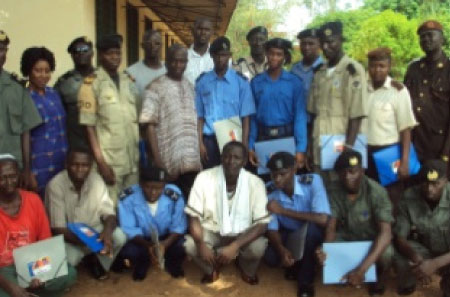
A three-day training workshop for officers of customs, police, immigration, NIA, National Drug Enforcement Agency, and other security enforcement agency on the detection, control and management of ODS ended recently.
Speaking on the occasion, Momodou B. Kanteh, director of Technical Service Network (TSN) at the National Environment Agency, said the Gambia government is showing firm commitment to phasing out the consumption and production of Ozone Depleting Substances (ODS) by 2010.
The country has ratified both the Vienna Convention and the Montreal Protocol on substances that deplete the ozone layer, says Mr Kanteh.
The ozone layer is the primary protection the earth has from the harmful rays of the sun, as the UV-B radiation from the sun has an adverse effect on human and animal health, marine and terrestrial eco-systems and can cause diseases such as skin cancer, eye cataract, and the destruction of the immune system.
Kanteh however disclosed that the continuous emission of Chloro-Fluoro-Carbons (CFCs), Halons and Methyl Bromide would deplete the ozone layer and this will result into more severe environmental and health problems.
Recognising the vulnerability of human beings, Flora and Fauna to ODS, the NEA director of Technical Service Network said the NEA and the Gambia government have over the years taken giant steps towards the reduction and ultimate elimination of ODS through a number of measures.
By the end of the training, according to Kanteh, participants are expected to clearly understand what ozone and ozone depletion is all about and would understand the reason why they must join the rest of the world to protect the ozone layer by phasing out CFCs.
Abdou Jeng, a senior customs officer and a trainer, called on colleagues in the security to lead the fight against the smuggling and illegal entry of depleting substances into the country.
The training was held to strengthen the capacity of enforcement agents to enhance proper identification and detection of ODS at points of entry and or during circulation within the towns and villages.
The three-day training, which attracted over 20 participants from the North Bank and Lower River regions, is among series of trainings conducted and organised by the NEA for security officers and refrigeration technicians throughout the country.
Alhagie Sarr, ODS programme officer at the NEA, told participants at the training that the Gambia government “is committed to phase-out the consumption of Ozone Depleting Substances” leading to the country’s ratification of the Vienna Convention for the protection of the Ozone Layer in May 1990 and the Montreal Protocol on substances that deplete the Ozone Layer in June 1990.
“The Gambia has also ratified the Copenhagen and London Amendments to the Montreal Protocol in 1992 and 1995 respectively,” he said.
The programme officer therefore urged participants to disseminate the knowledge and skills gained from the workshop to others who could not have the opportunity to attend it.
Sheikh Alkinky Sanyang, NEA`s Environmental Education and Communications Officer, says nature is at conflict with mankind.
He therefore appealed to the participants to use environmentally-friendly activities and devices to make the planet Earth the only suitable and lasting home for generation yet unborn.
NBR Regional Environment Officer Ndenneh Nying expressed similar sentiments in his speech on the occasion urging participants to take ownership of the environment to enable and propel holistic attitudinal change.
Read Other Articles In Article (Archive)
Show: Kinkiliba in fundraising concert
Jul 2, 2010, 4:46 PM



